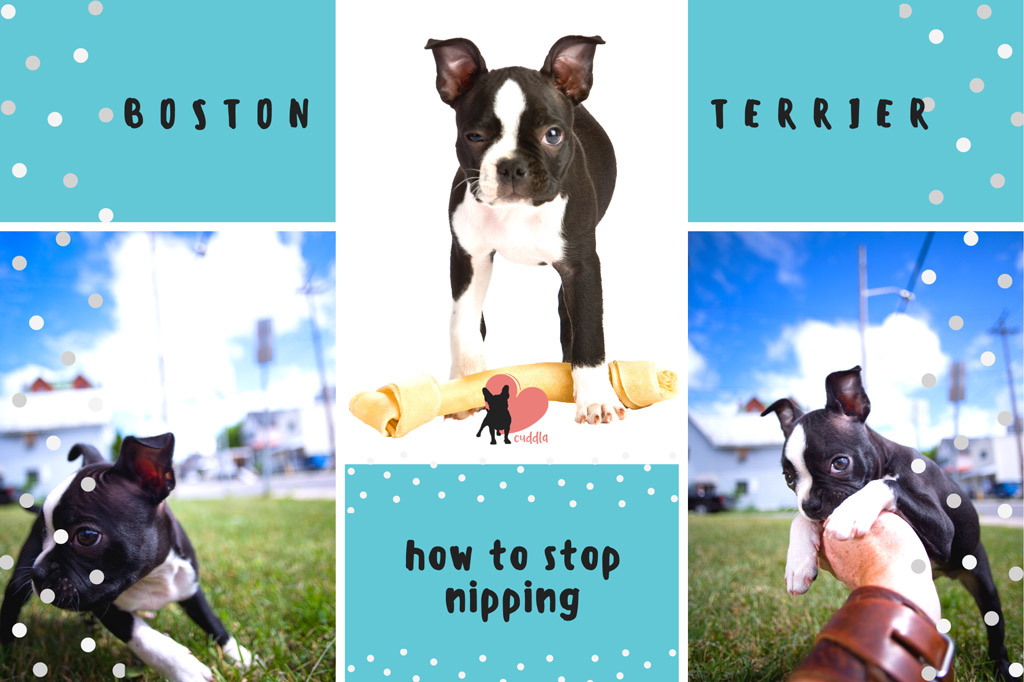
All puppies go through a nipping stage, but as a dog parent, you might find that you need some help to re-direct your Boston Terrier’s nipping behaviour.
Although your Boston Terrier puppy should naturally outgrow this stage on her own, you might still be wondering what you can do in the meantime…
How do I get my Boston Terrier to stop biting?
This is what I’ll help you with here. Keep calm and follow the training below, so you can survive your Boston’s puppyhood with fewer “ouch”s! 🙂
Boston Terrier Nipping Behaviour
Puppies like to chew and bite!
It’s a healthy behaviour for them to learn how to inhibit their bite through rough (rather than aggressive) and tumble play with their mother and littermates.
Why Do Puppies Bite and Mouth Things?
When your Boston pup is biting you during playtime, it’s because she’s trying to interact with you in the only way she knows-how.
What your puppy is seeking is for you to interact back. She’s trying to grab your attention and get you to play with her!
If you react by shouting “no, don’t, stop, cut it out!” and/or move your hands around to stay out of her reach…
You are reacting to your puppy. i.e., as far as she’s concerned, you’re playing back and encouraging her to go after those flying hands! (Refer to How to Stop Boston Terrier Nipping section below to know what you should be doing instead).
You may have noticed that your puppy is quite the explorer!
Since she’s got no “hands”, the way she explores the world is with her mouth. Everything goes into her little mouth, including your fingers, even though those baby teeth are like little needles. Ouch!
It’s a completely healthy behaviour for puppies in their litters to bite each other when playing. During these games, they learn how to control the strength of their biting.
If one puppy bites another too hard, that puppy probably will yelp and stop playing. If that happens enough times, the biter learns to apply less pressure.
However, those social boundaries only apply to dog-to-dog interaction. The same level of bite pressure that is appropriate during puppy play can hurt us and even break human skin.
The inhibition and control they learn in the litter help, but it’s usually not enough to teach your pup how to properly interact with humans.
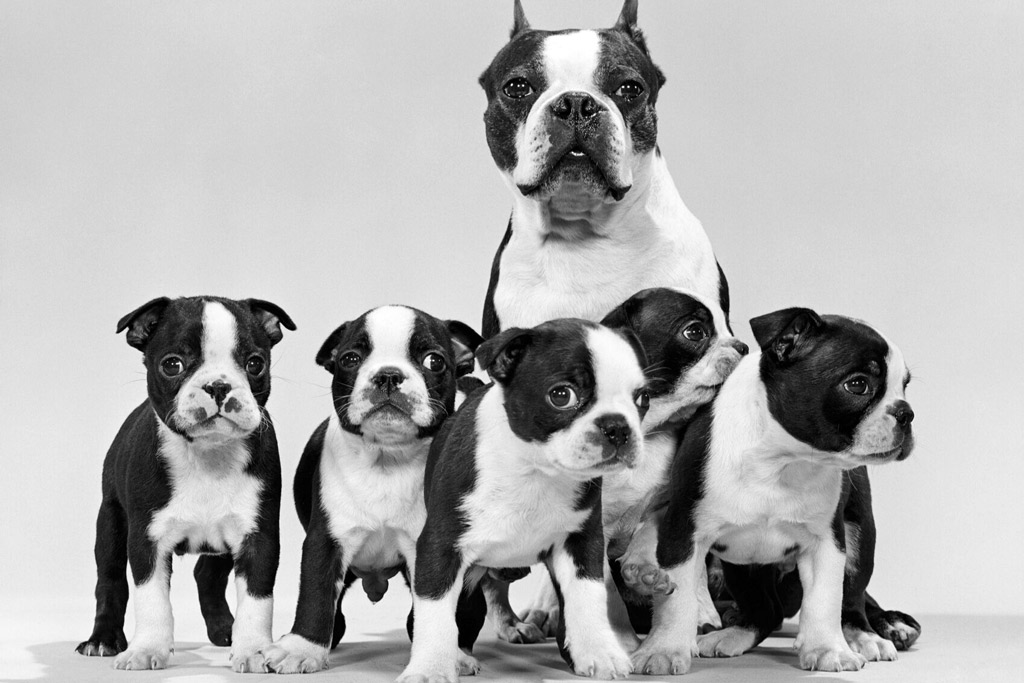
What Are the Teething Stages?
Puppies baby teeth will begin to appear when they are 2 to 4 weeks old.
During the age of 4 to 6 weeks, the inhibited biting starts. Like I mentioned above, they will explore their social boundaries, and how to communicate effectively with other dogs.
If your pup stayed with her mom and siblings until she’s 8-10 weeks old, she will usually have learned more appropriate social behaviour and bite inhibition.
Read also: Boston Terrier Growth Stages and Puppy Development Chart to know what to expect on each of your pup’s growth stages!
Between 3 to 6 months of age, adult teeth start coming out and your pup will begin chewing. Most puppies tend to be “mouthy” during the “Ranking Stage”. This is the stage that concerns you. Now it’s your turn to show your pup what are the house rules and that biting is not allowed.
The sooner you teach your Boston Terrier, the easier it is to guide your pup not to nip and bite during play and when excited.
When she gets older and biting becomes harder, it becomes more difficult to stop it. Refer to the When Your Adult Boston Terrier Still Bites… section below.
However, how your Boston Terrier pup learns to inhibit her bite matters.
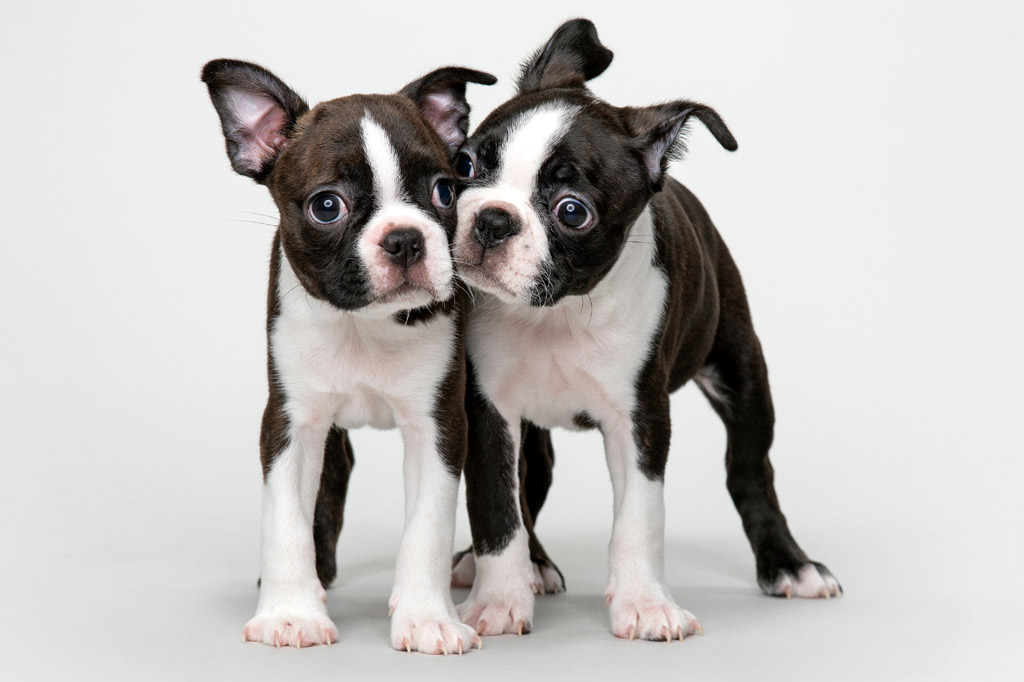
How to Stop Boston Terrier Nipping
Training your Boston Terrier Puppy not to bite is important when teaching her the house rules and establishing the boundaries that your pooch should respect as she grows.
There are several things you can do to establish this important boundary while you communicate to your Boston Terrier puppy that nipping or biting during play or from excitement, is not an acceptable behaviour:
#1 – Stop Playing Immediately
Every time your puppy nips you, immediately STOP and withdraw all interaction.
The scenario looks like this:
- When your pup nips you, stop what you are doing straight away.
- Remove your hands from your puppy’s reach without waving them to avoid attracting her attention.
- Alternatively, you can yelp “ouch!” when your Boston nips you. This simulates what your puppy’s sibling would do when bitten too hard. Then, let your arm go limp without pulling away, stopping any interaction.*
- Even if your pup only has a momentary hesitation, this is enough to know that the message is being understood.
- When your pup is calm (or after that small pause), you can slowly offer one hand to her mouth. At this point, many puppies will lick the hand.
- This, or any behaviour that is NOT biting, should be rewarded with continued attention.
- But if you get another nip, you go back to step 1 and immediately stop all interaction.
*Note: Some puppies can respond to a yelp by biting harder. They associate the sound to a “squeaky toy” game. If your pup seems delighted by the sound, don’t use the yelping sound.
Insider Tip: If you react by shouting “no!”, moving your hands… your dog won’t understand your words and will chase those moving hands.
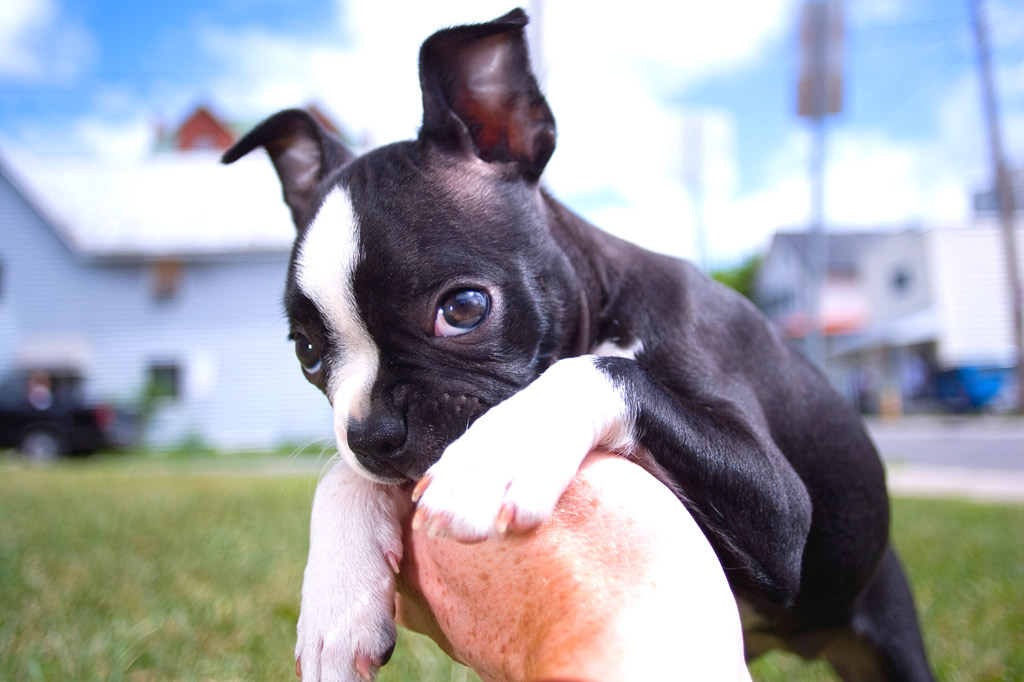
#2 – Redirect The Biting Behaviour
Your Boston Terrier puppy may need to chew as she’s teething. But she needs to understand what is an appropriate chewing material: toys and bones, not people!
A great way to prevent nipping is to provide chew toys like Nylabone Flavored Bone. Refer to Boston Terrier No Biting Essentials section below for tips on choosing chew toys!
A likely scenario:
- Start playing with your Boston Terrier puppy using a toy.
- When your puppy’s mouth goes to your hand, either tap the chew toy or tap your pup on her side with it. You want to redirect her attention away from your hand.
- Your pup should release your hand and instinctively turn her head towards the toy or to see what is touching her flank.
- Now wave the chew toy to get her attention focused on it.
- Once she engages, reward your puppy each time for redirecting her play towards toys or chews.
- Continue to play, allowing your Boston to grab and chew on the toy.
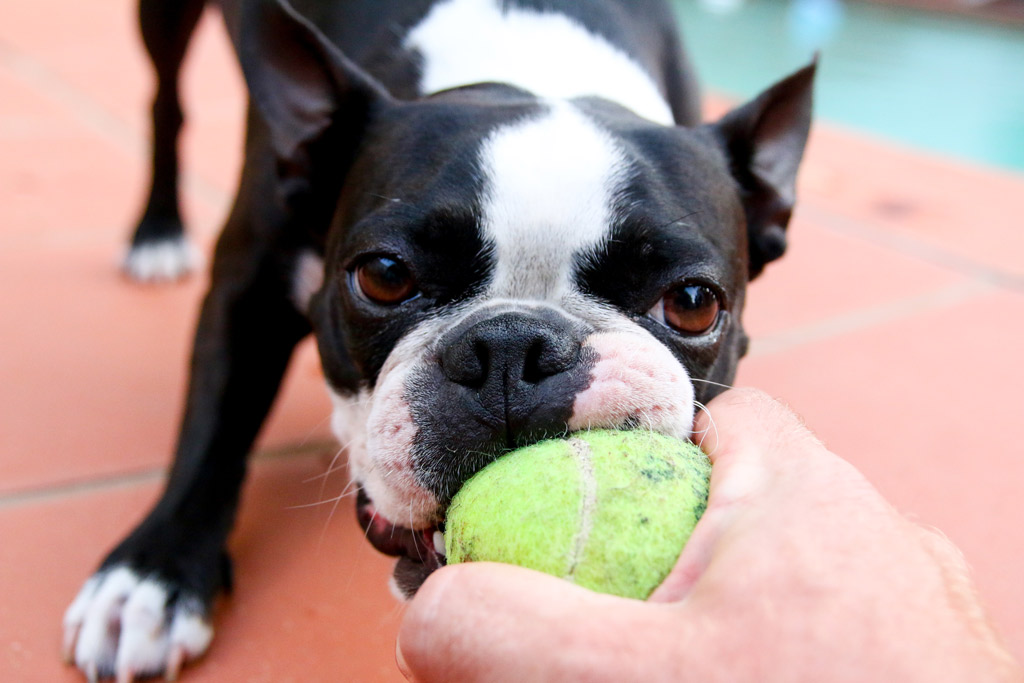
#3 – Don’t Reinforce Biting Behaviour
It can be easy to unconsciously reinforce bitting behaviour.
When nipping, immediately stopping, not reacting and not giving your pup attention prevents reinforcing the behaviour.
Also, avoid rough-housing or wrestling with your pup with your hands. This type of interaction will ruin your efforts of stopping your pooch targetting your hands as by doing so you are confusing your pup with a game that in essence tells her, “Go for my hands!”
Instead, always use a toy when playing with your pooch, including tug of war or fetch games. Check my favourite dog toys guide for toys and game ideas to enjoy with your Boston Terrier!
Insider Tip: Remember that all play must be gentle whilst your pup learns to inhibit her bite.
Also, since dogs are attracted to anything that moves… Movements away from her must be immediate and smooth, and movements towards her must be calm and purposeful.
#4 – Stay Consistent
Repetition is key for your dog to learn. So, stay consistent, persistent, and patient whilst your pup learns not to bite.
You will need to provide firm direction without losing your temper, which sometimes can be difficult. It’s easy to feel hurt; however, you need to be careful since dogs can easily read your emotions and your reaction can confuse her or make her anxious.
Do your best to stay calm and be consistent when your pooch nips you. Also, make sure everyone in your household is on board. Your family, as well as visitors, should be aware of your “no biting policy” to maintain consistency and avoid reinforcing biting behaviour.
Eventually, your pooch will outgrow it. Then, she might put her mouth around your hand when playing, but she won’t bite.
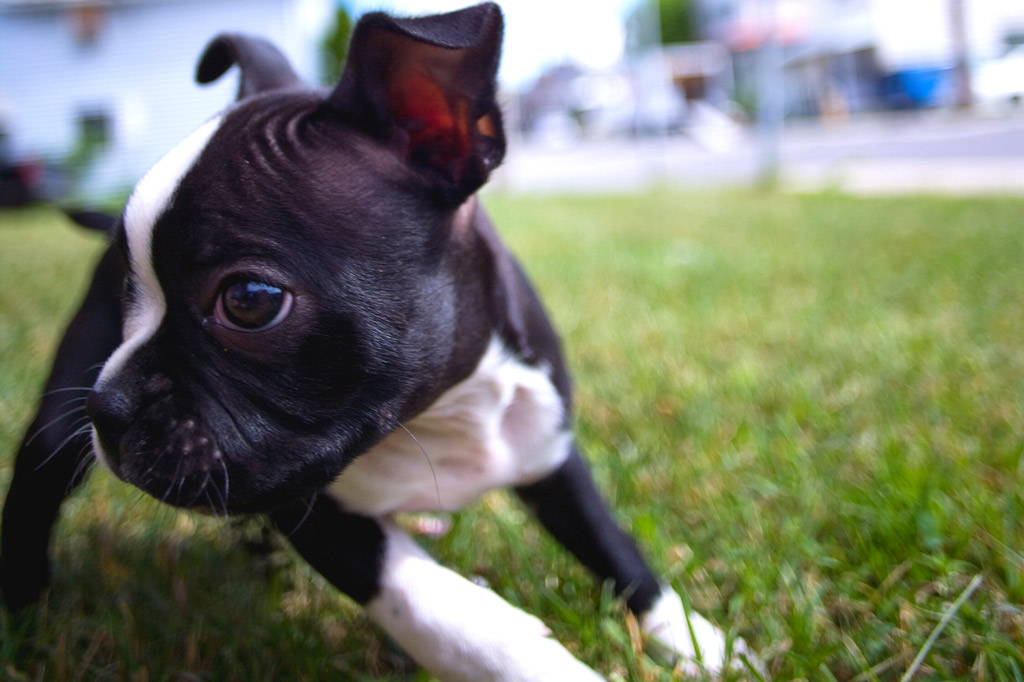
#5 – Reward Good Behavior
Remember that you are the main influencer for your pup. Positive reinforcement training and spending quality time with your pooch are very important.
Reinforcing good and calm behaviour encourages your Boston Terrier to repeat it since she enjoys the outcome. So, always reward her with praises, caresses and treats!
Insider Tip: Never hit or punish your Boston puppy. Don’t close her mouth when she nips. She won’t understand why you are doing it. Negative reinforcement will cause her to be afraid of you and not to trust you.
#6 – Make Sure You Meet These Needs
Finally, make sure you follow these key activities to ensure your pup’s healthy development:
- Training sessions: Our Boston Terrier Training guide will save you valuable time.
- Playtime: Check Boston Terrier Activities for games and toys.
- Exercise: Such as daily walks. Find out your Boston Terrier’s Exercise Needs.
- Socialization: Socializing your pup from an early age can prevent many unwanted behaviours, including biting and aggression. However, don’t let your pup around people until she is ready (especially if you are teaching her not to bite). Go to Boston Terrier Socialization In 8 Steps for a step by step guide and a useful socialization checklist!
When Children Are Involved…
Here prevention is key. So, never leave your dog and children unsupervised.
Kids are unaware of a dog’s body language and are not able to read a dog’s warning to back away. This is one of the main causes of bites in children. Also, your pooch probably plays too rough for your kid to handle.
It’s up to you to keep an eye on both of them and teach them how to interact with each other.
Plus, your kid can easily reinforce the bitting behaviour. It’s hard for young children not to squeal, dance, wave their hands around and run when a puppy is nipping at them. These reactions, obviously, will delight your pup and encourage her to continue “playing”!
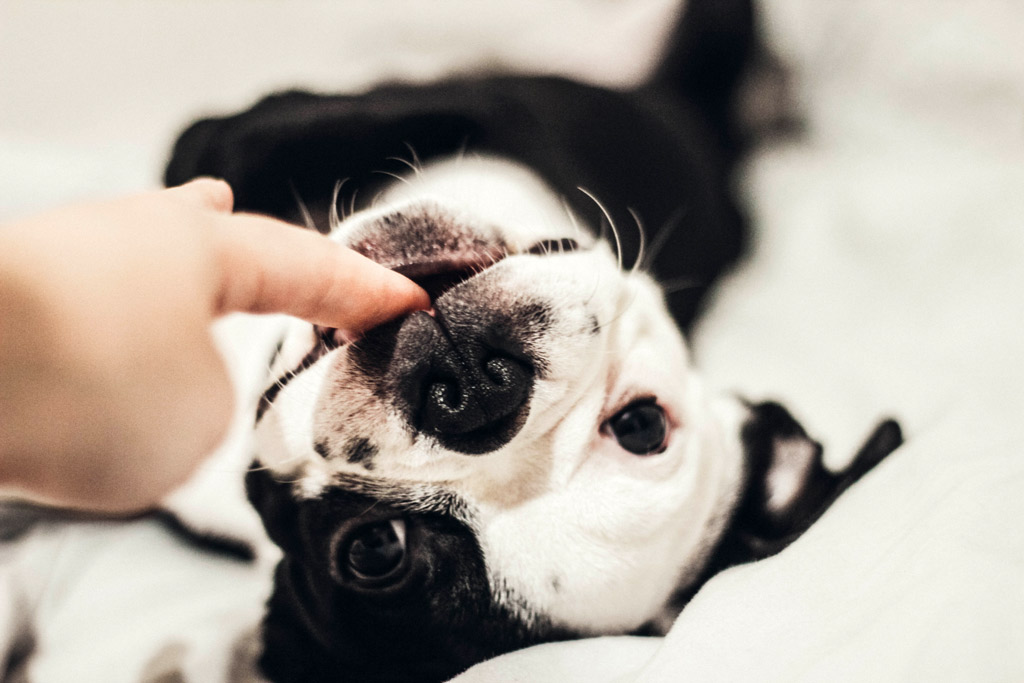
When Your Adult Boston Terrier Still Bites…
What if your older Boston Terrier is still biting?
Usually, Boston puppies will grow out of biting. However, if your adult Boston Terrier still bites, you might need a dog trainer (online and face-to-face classes). Refer to What’s Next below for further advice.
There are a few reasons for your adult Boston to keep biting:
- Attention-getting: The previous owner or yourself have reinforced the biting behaviour by giving attention to the dog.
- Fear and anxiety: Due to bad past experiences, your dog can react in a fearful, anxious and aggressive (in extreme situations) manner.
You still want to follow the steps above to teach your dog not to bite, but it will take more time and effort.
Read also: Boston Terrier Separation Anxiety – 16 Things that Help and Boston Terrier Fears and Anxiety – Triggers and Remedies blog posts.
Boston Terrier No Biting Essentials
Since most dogs enjoy chewing…
Here’s a type of toy that works for a pup, adult and senior Boston Terrier:
Chew Toys
For puppies, chewing is a way to relieve pain that might be caused by teething. Adult dogs chew to keep their jaws strong and their teeth clean.
Chewing also combats boredom and can relieve mild anxiety or frustration. So, a great way to prevent nipping is to provide chew toys like Nylabone Flavored Bone.
When choosing a toy, your dog’s age is a key consideration:
- A three-week-old puppy: She still has her baby teeth. She needs toys with softer rubber or plush toys.
- From three to nine months: Your puppy will be teething, so avoid hard rubber. To help her cope with the pain and discomfort, have a good variety of chew toys that will keep her distracted from chewing everything else!
- Once the teething phase passes: Your dog will have a strong enough jaw for harder rubber toys, depending on her being an average or extreme chewer. Also, focus on her endless energy to play with balls or tug toys.
- By age seven or so: Your senior dog’s mouth strength will decrease. It’s time to give her softer toys to chew. Also, encourage her to stay active by playing with other toys that she might like.
Use my favourite dog toys guide for toys and game ideas to enjoy with your Boston Terrier!
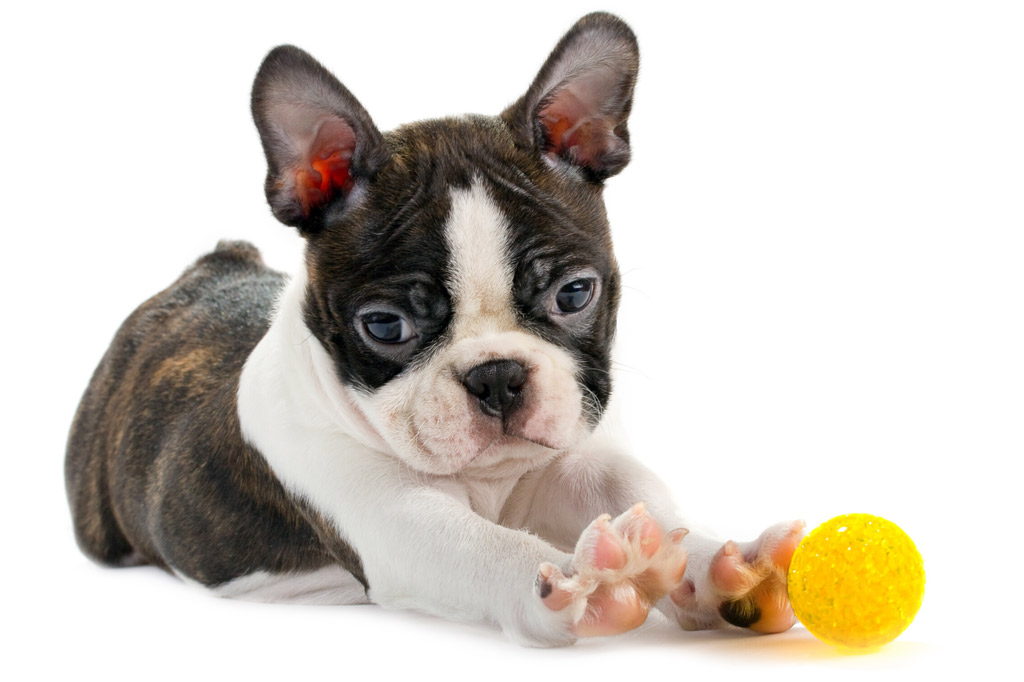
What’s Next
Your Boston Terrier pup nipping you and everything around her is one of the 3 most common challenges puppy parents face; the other 2 are:
- Potty training.
- Leash pulling.
If you find yourself struggling, overwhelmed or needing some expert insight, I may be able to help with that.
Click here to visit our Dog Training Essentials, where you will get a 3-part mini audio series + the everyday resource used by a well-known dog trainer.
You can also get this using the button below. Happy training! 😉
